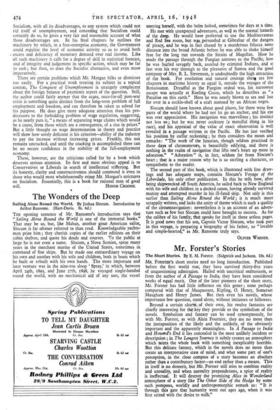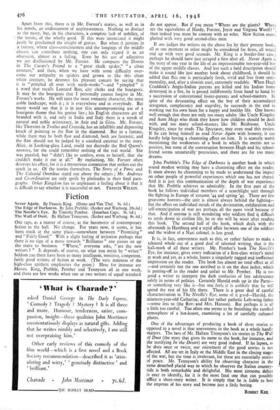Mr. Forster's Stories
The Short Stories. By E. M. Forster. (Sidgwick and Jackson. 10s. 6d.)
MR. FoesrEe's short stories need no long introduction. Published before the first world war, they have Survived thirty-five years of unquestioning admiration. Hailed with uncritical enthusiasm, as from the author of A Passage to India, they have been considered works of equal merit. One of the later pioneers of the short story, Mr. Forster has had little influence on this genre ; none perhaps compared with that of Maupassant, Kipling, 0. Henry, Somerset Maugham and Henry James. But then even his novels, whose importance few question, stand alone, without imitators or followers.
Beyond a certain chattel-cot their own, his twelve fantasies are chiefly interesting for tit.. key they provide to the symbolism of the novels. Symbolism and fantasy can be used synonxmously, for with Mr. Forster, as with Alain Fournier, they are no more than the juxtaposition of the likely and the unlikely, of the obviously important and the apparently meaningless. In A Passage to India and Howard's End it lies concealed in the most unlikely incident or description ; in The Longest Yourney it subtly creates an atmosphere which taints the whole book with something inexplicably horrible. But this delicate fantasy, which in the novels does no more than create an interpretative state of mind, and whet some part of one's perception, in the close compass of a story becomes an absolute rather than a contributory factor—an end rather than a means. This in itself is no demerit, but Mr. FOrster still tries to combine reality and unreality, and when unreality preponderates, a spice of reality is ineffectuaL It will destroy the promising Alice in Wonderland atmosphere of a story •like The Other Side of the Hedge by some such pompous, worldly and anthropomorphic remark as: " It is through this gate that humanity went out ages ago, when it was first seized with the desire to walk." Apart from this, there is in Mr. Forster's stories, as well as in his novels, an undercurrent of unpleasantness. Nothing so distinct as the nasty, but, in his characters, a complete lack of nobility, of the heroic, of the wholly good. If this were intentional it might justly be proclaimed the insight of genius. But when it persists in a fantasy, where class-consciousness and the longings of the middle classes can contribute nothing, one can only regard it as an obsession, almost as a failing. Even by his use of adjectives we are disillusioned by Mr. Forster. He compares the Downs in The Curate's Friend to a " great chalk spider," " a clean creature," and then, when we have with some difficulty over- come our antipathy to spiders and grown to like this clean white creature, he destroys his pleasant conceit by saying that it is " pimpled all over with earth-works "—and " pimpled " is a word that recalls Leonard Bast, city clerks and the bourgeois. It may be the bourgeois that I personally cannot forgive in Mr. Forster's works. He will taint the most romantic character, the most noble landscape, with it ; it is everywhere and in everybody. But many would say that it is in just this uncompromising use of a bourgeois theme that his genius lies ; his English characters are all branded with it, and only in India and Italy there is a streak of natural and noble aristocracy, in Aziz and in Gino. Mr. Forster, like Thersites in Troilus and Cressida, has an infallible and depressing knack of pointing to the flaw in the diamond. But in a fantasy, while there may be both flaw and diamond, both are fantastic, and the flaw should not be judged by a standard external to the story. Alice, in Looking-glass Land, could not discredit the Red Queen's answers, for she could remember nothing of the real world. She was puzzled, but " didn't like to confess, even to herself, that she couldn't make it out at all." By explaining, Mr. Forster often destroys his effect, for it is a mysterious connection that strikes out the spark in us. Of the stories themselves, The Story of a Panic and The Celestial Omnibus stand out above the others ; Mr. Andrews and Co-ordination are only spoilt by platitudes in their final para- graphs. Other Kingdom has so unpleasant a feeling about it that it is difficult to say whether it is successful or not. FRANCIS WELKIN.































 Previous page
Previous page